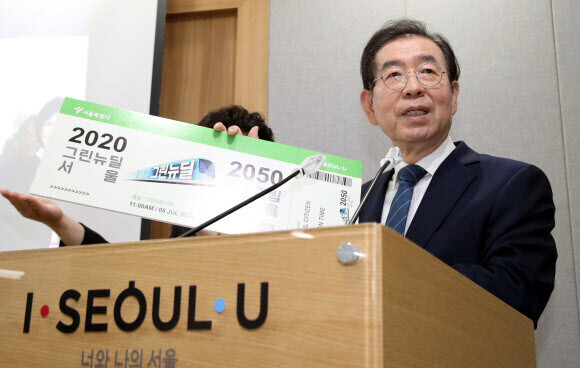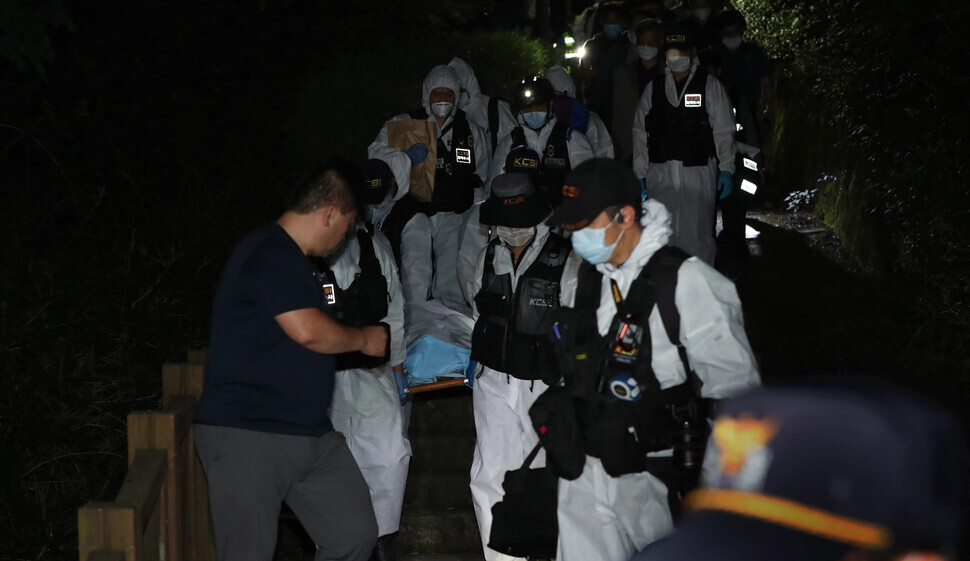hankyoreh
Links to other country sites 다른 나라 사이트 링크
Park Won-soon discovered dead at 64 on July 10

The body of Seoul Mayor Park Won-soon, 64, was found near Sukjeong Gate, on Mt. Bukak, Seoul, in the early morning hours of July 10. About eight hours had passed since Park’s daughter reported to the police on July 9 at 5:20 pm that she’d lost contact with her father. The key factor behind Park’s apparent suicide appears to have been a sexual harassment complaint filed by a former secretary.
Sources from the police and the city say that the police received a complaint alleging sexual harassment by the mayor on July 8, the day before he went missing. The complainant spoke with the police with her attorney present until early in the morning on July 9.
The complainant, a former secretary of Park’s, told the police that his sexual harassment had continued since the time she began working as his secretary in 2017. She said that Park had sent her private photographs on several occasions over the messaging app Telegram. She reportedly submitted a considerable amount of evidence backing up the alleged harassment, including messages she had exchanged with Park over Telegram, and also said she wasn’t the only person that Park had sexually harassed.
This complaint appears to have placed considerable psychological pressure on Park. A former human rights lawyer, Park played an instrumental role in founding People’s Solidarity for Participatory Democracy (PSPD) in 1994. While serving as the nonprofit’s secretary-general, Park opened a new chapter in Korea’s civic movement, calling for the monitoring of law enforcement and protection for small-scale shareholders at the chaebols and campaigning against politicians who he deemed unfit for office.
In 1993, Park was on the legal team in a case that raised awareness in Korean society about the crime of sexual harassment. Along with Lee Jong-geol and Choe Eun-sun, Park represented a teaching assistant at Seoul National University (SNU) in the country’s first sexual harassment case, which ended in 1998 when the Seoul High Court ordered a SNU professor surnamed Shin to pay the teaching assistant 5 million won (US$4,154).

In the 2000s, Park helped break new ground for the civic movement at such organizations as the Beautiful Fund, the Beautiful Store, and the Hope Institute. When then Seoul Mayor Oh Se-hoon stepped down in 2011, Park won a by-election to replace him with the support of then SNU professor Ahn Cheol-soo, marking the beginning of Park’s political career. During his three terms as Seoul mayor, Park experimented with a variety of reforms and innovative policies.
Park was also a prominent advocate of women’s issues, creating a women’s rights coordinator to prevent sexual violence and protect victims and appointing a special advisor for gender affairs to oversee the city’s policy for women in 2018.
“I realized how important gender equality is while serving as a legal advisor for a number of women’s organizations. Careless words and actions can cause great pain and harm to other people,” Park said while attending a sexual harassment prevention training session at Seoul City Hall in April 2019. During the same session, Park asked Seoul’s civil servants to become more sensitive to gender issues.
The massive social disgrace Park would have face was likely the factor behind his suicideThus, the allegations of sexual harassment fly in the face of the words, actions, and professed values of this former nonprofit organizer and leading progressive politician, whose reputation was grounded in his commitment to the cause and his moral principles.
“Park stressed morality over anything else, so I had no idea that something like this would happen,” a senior official at Seoul City Hall remarked. Given the social disgrace that Park expected to suffer because of the apparent disconnect between his public stances and private behavior, it seems likely that, after much reflection, he decided to take his own life.
Park also appears to have mulled taking responsibility by apologizing to the victim and resigning as mayor. When Park learned that his former secretary had filed a complaint against him on the evening of July 8, his aides, including his special advisor for gender affairs, reportedly met to discuss what action should be taken. In that meeting, his aides spoke of the need for Park to step down. But as a three-term mayor of Seoul and a strong contender in the next presidential election, Park was apparently unable to countenance the prospect of facing the judgment of the courts, and of the Korean public.
By Song Kyung-wha and Ock Kee-won, staff reporters
Please direct comments or questions to [english@hani.co.kr]

Editorial・opinion
![[Column] Has Korea, too, crossed the Rubicon on China? [Column] Has Korea, too, crossed the Rubicon on China?](https://flexible.img.hani.co.kr/flexible/normal/500/300/imgdb/original/2024/0419/9317135153409185.jpg) [Column] Has Korea, too, crossed the Rubicon on China?
[Column] Has Korea, too, crossed the Rubicon on China?![[Correspondent’s column] In Japan’s alliance with US, echoes of its past alliances with UK [Correspondent’s column] In Japan’s alliance with US, echoes of its past alliances with UK](https://flexible.img.hani.co.kr/flexible/normal/500/300/imgdb/original/2024/0419/2317135166563519.jpg) [Correspondent’s column] In Japan’s alliance with US, echoes of its past alliances with UK
[Correspondent’s column] In Japan’s alliance with US, echoes of its past alliances with UK- [Editorial] Does Yoon think the Korean public is wrong?
- [Editorial] As it bolsters its alliance with US, Japan must be accountable for past
- [Guest essay] Amending the Constitution is Yoon’s key to leaving office in public’s good graces
- [Editorial] 10 years on, lessons of Sewol tragedy must never be forgotten
- [Column] A death blow to Korea’s prosecutor politics
- [Correspondent’s column] The US and the end of Japanese pacifism
- [Guest essay] How Korea turned its trainee doctors into monsters
- [Guest essay] As someone who helped forge Seoul-Moscow ties, their status today troubles me
Most viewed articles
- 1[Column] The clock is ticking for Korea’s first lady
- 2Hong Se-hwa, voice for tolerance whose memoir of exile touched a chord, dies at 76
- 3After 2 months of delayed, denied medical care, Koreans worry worst may be yet to come
- 4[Column] Has Korea, too, crossed the Rubicon on China?
- 5Samsung barricades office as unionized workers strike for better conditions
- 6US overtakes China as Korea’s top export market, prompting trade sanction jitters
- 7All eyes on Xiaomi after it pulls off EV that Apple couldn’t
- 8[Guest essay] How Korea turned its trainee doctors into monsters
- 9[Editorial] As it bolsters its alliance with US, Japan must be accountable for past
- 10[Correspondent’s column] In Japan’s alliance with US, echoes of its past alliances with UK